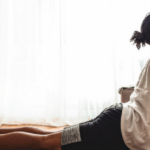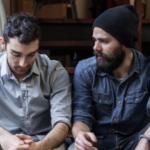Aaron, 27, is a former teacher and Regional Coordinator at Top Blokes – a youth mental health charity that mentors boys young men to lead happier and healthier lives. It’s mentoring he had to turn on himself when he finally reckoned with the depression that’d dogged him since losing his best mate at 18. Here he shares how he came to realise he was struggling and what helped him finally manage his mental health better.
I didn’t even know mental health existed. I don’t remember ever hearing about it growing up. The area I grew up in is like a lot of Australia – it’s a working-class region and a lot of people, particularly men, weren’t aware of what mental health is, how it affects us and how we can look after it.
Looking back, I’d always experienced a bit of anxiety, like nervousness. But I didn’t recognise that I was experiencing depression straight away. It was a result of losing my best friend in a car accident, about a month after I turned 18 and he was only a couple of months off 18. It was such a shock.
We were two peas in a pod. We had the next phase of our life mapped out together, planning to go to uni and do some travel.
When you lose someone so close, it’s really difficult to cope. After he passed it was pretty evident that I didn’t have many skills around how to cope with challenging situations and I didn’t have a whole lot of resilience. In response, I took a path of avoidance.
Between 18 and 21 it’s pretty standard to go out and party and it was easy to put that down to my age, but looking back it was also a way of coping and avoiding my feelings. That realisation didn’t come until a few years later, when I really started to see the effects of the experience and ignoring my deep grief.
I realised I hadn’t paid enough attention to how I was feeling and when you’re in a rut it’s very easy to forget how you used to feel and be able to recognise that what you’re feeling isn’t quite normal.
Depression initially popped up as ‘I don’t like my job’ or ‘I don’t like what my life looks like right now’
I didn’t have those classic symptoms of not being able to get out of bed. I just wouldn’t take a break, I couldn’t slow down. I was working three jobs. I was heavily reliant on routine. Exercise was the thing that kept me going I would get up every day and train. It was avoidance. When I’d stop and recognise how I felt, it didn’t feel good. So I just kept going.
It also manifested in my view of relationships and how I treated other people, which probably wasn’t always as reflective of the type of person I like to think I am. I had a lot of apathy towards certain things.
What it was, in reality, was that I didn’t have the opportunity or the skills to deal with what I’d experienced after my mate’s death. It was a delayed onset of depressive episodes.
I felt crappy a lot of the time, but I never had this crucial, rock-bottom moment where it’s like, the only way is up. I don’t know if I was waiting for that before I took some action.
Managing my depression started with a long period of learning more about myself. It began from a health and fitness perspective. I started to really prioritise looking after myself physically which naturally led to looking at my mental health. I’d just started working with Top Blokes and that was a big part of what we do. On the job I was learning and realising, this is what I’m experiencing and have been for the last few years. And there were fellas ten years younger than me that were saying the same things and going to see a psychologist and I was like, man if they can do it, I can do it.
I had a conversation with my grandma after my mate passed away and she was like, you should go and see a psychologist. I said no, I’m not going to worry about that because it’s not going to bring him back. That was my attitude for a while, like, what’s the point?
After another six or so months of not taking action, I decided to start seeing a psychologist
I’d done some research and through work, I was more open to it at that point. That is the most important part because it wouldn’t have worked otherwise. Initially, it was just about getting to the bottom of what I’d been experiencing. I wasn’t sure if it was depression or anxiety but I wanted a label to justify or clarify my experience. At the start, it was hard and felt super uncomfortable but in the end, I quite enjoyed it and started to view it as maintenance. We exercise daily, we should also see a psychologist regularly to exercise mental fitness. Shifting my mindset was really helpful in my approach to it and making it a bit less scary.
I did a lot of research into gratitude and the way our brains are innately designed to focus on negative things, so I’m trying to retrain myself to look at the positives. I focused on my diet and relationships and a lot of intrinsic stuff about coming to the realisation that I was playing the victim in the story for a long time. It was a terrible thing that happened to me and it’s unfair. I was able to switch to the mindset of ok this is something that happened, but I have the opportunity to create a life.
Every day I look for things that are good in my life and a big one is planning and having goals so I’m not aimlessly going about my days or weeks. But the caveat with that is having strict goals can have negative effects too. My previous mindset was quite fixed and I could be quite unkind to myself if I wasn’t getting up and training in the morning, or if I wasn’t meditating every single day, or doing gratitude. That was counterproductive. Training my inner dialogue to be friendly was important.
I did keep it hidden from my friends and family for quite a while. I felt a sense of having to protect my parents and my grandparents from knowing, because they went through the experience of losing my mate too and it was really tough for them as well. I did a podcast talking about my experience recently and I found a lot of people in my life had similar stories they wanted to talk about.
It’s still very much a work in progress. I don’t look at it like it’s ‘cured’ but I do look back at those years in hindsight now
With the boys we work with, I feel like there’s less stigma about mental health now. Enough people have had experiences with or know someone who’s suffered through a mental health challenge to know it’s real. They’re also more aware of strategies to look after their mental health and the mental health of others. But they still hold back and they’re not all that vulnerable with one another.
Everyone’s experience with depression is very different and it can be very individualised. My experience didn’t really resonate with other stories I’ve heard about depression. That was a part of why I wasn’t sure about what was going on and whether I needed help.
My advice to any other young fellas struggling is to always access professional support as early as possible because that gives you the best chance of getting to the bottom of what’s going on and understanding how you’re feeling. You aren’t going to get turned away because your problems aren’t big enough or bad enough yet.















